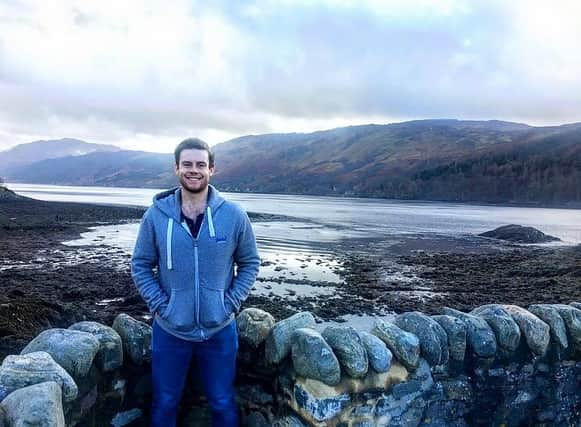Edinburgh mental health sufferers speak out on life under lockdown


THE coronavirus lockdown has been recognised as a potential threat to everyone’s mental health - but for people already struggling to cope with conditions like anxiety and depression the Covid-19 restrictions represent a real challenge.
Former city MSP and minister Marco Biagi spoke out strongly on social media at the weekend about the need to get the message right.
Advertisement
Hide AdAdvertisement
Hide AdMr Biagi, who revealed last year that he had been diagnosed with major depression in 2002 and tried to kill himself soon afterwards, tweeted: “I live alone in a 52sqm flat and haven’t interacted with anyone in person for 54 days. I’m tired of reading that all I need to do is keep routine, eat well and take a walk every day. Those are the functions that shut down first. It’s like blithely advising anorexics to ‘eat up’.


“A friend used to joke about the well-intentioned but hopeless support typically on offer that she characterised as ‘oh, you’re suicidal, have you tried Fun With Fabric?’ Right now it’s like the UK is being told to make shapes out of felt until it all goes away.”
Mr Biagi, 37, who quit as MSP for Edinburgh Central in 2016 for health reasons, continued: “For many, recovery isn’t something you do once, it’s something you have to do continuously your whole life.
“Without naming names, a lot of organisations should take a hard look at how they’re presenting themselves and remember it’s not just the worried well they are addressing.
Advertisement
Hide AdAdvertisement
Hide Ad“I’ll get by, somehow. Others will too, still others won’t. But can we please just acknowledge the toll this is taking and recognise how it sounds when the advice is no more profound than you’ll feel better if you do the hoovering.”
PR consultant Gareth Brown, 29, has had depression and anxiety for years and has found lockdown difficult.
“It’s been a tricky time,” he said. “A lot of your coping mechanisms are taken away from you, whether that be seeing friends and family or being out and about. I live in a small one-bedroom flat in Gorgie so there’s no garden or anything. You’re relying on your one hour of exercise a day or Zooms or Facetime.
“I’ve done OK because I’m still working so that gives you a wee bit of routine during the day, but in a small flat there’s only so many different places you can sit to do your work or have coffee or whatever. It’s just a very lonely, isolated time. I suspect there’s a lot of young men out there who live by themselves and feel the same.”
Advertisement
Hide AdAdvertisement
Hide Ad“I count myself as one of the lucky ones because I have things to keep me occupied, but also because it’s something I’ve been working on for almost 15 years and I’ve built up that self-awareness to realise when I’m not feeling very good. For some younger men who are not sure what’s going on or why they feel low or haven’t spoken to many people about it, it’s probably a very dark and lonely time.”
He said over the years he had found ways of coping. “One of the things I have found really useful is to try and break down tasks. Sometimes if you feel low, something like going for a walk can seem like an insurmountable hurdle. What I’ve learned to do is break those sorts of thing down into very small bite-sized tasks like getting out of bed, having a shower, washing the dishes from the previous night - once you tick off a few you’ve got a bit of momentum under your belt. It gets you off on the right foot and helps make the day a bit more manageable.”
And he said it was important not to turn to drink for comfort. “Sometimes when you’re in this situation, having couple of glasses of wine in the evening seems a way to cheer yourself up but it actually just can make things a lot harder. It’s really important to be aware of your alcohol consumption.”
But he said there was a lot of support on offer. “There are some really good mental health podcasts - like Man Up - which are really accessible, they’re not pious or preachy, and it doesn’t feel as if you’re reading a self-help book.
Advertisement
Hide AdAdvertisement
Hide Ad“Particularly with men, peer to peer is really important. It can be quite a brave thing to do, but just trying to talk to your friends about how you’re feeling, the chances are with men two out of five of them will feel the same way.”
Toni Giugliano, senior policy manager at the Mental Health Foundation, said official messaging during the lockdown had to target both the general public and those with diagnosed mental health conditions.
“We need to do two things - we need to prevent people who don’t have a mental health problem from developing one because of the lockdown. We know what happens during times of financial instability or insecurity - people are more likely to develop mental health problems and more likely to be at risk of suicide.”
He said basic advice about exercise, good diet and staying connected with other people did make a difference.
Advertisement
Hide AdAdvertisement
Hide AdBut he said: “If you have a serious mental health problem, depression for example, and now you’re in lockdown, perhaps you live alone and are unemployed or on low income, being told to go out for exercise and eat well just doesn’t cut it.”
He said there could be some improvement in the Scottish Government advice.
“The public health messaging has been very strong on the universal but it could be stronger when it comes to targeting people with mental health problems. That’s not to say services aren’t out there, they are.
“More effort could be made to speak to those with existing mental health problems, reminding them help is at hand and there are different forms of support available, I think we need to step that up.”
Advertisement
Hide AdAdvertisement
Hide AdA Scottish Government spokesperson said: “The bravery of Marco Biagi and others who publicly share their experiences of mental health issues is striking. This helps to open up debate and end stigma, as well as shaping the help we offer.
“We are always willing to listen, to ensure we get our advice right, and to improve the way we support people.”
Comment Guidelines
National World encourages reader discussion on our stories. User feedback, insights and back-and-forth exchanges add a rich layer of context to reporting. Please review our Community Guidelines before commenting.